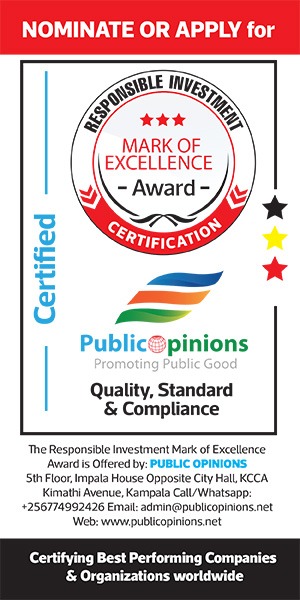The United Nations Development Programme (UNDP) is a winner of the 2015 Uganda Sustainable Development Award and accredited Uganda’s Top50 Sustainable Development Agencies in recognition and appreciation of its enormous contribution towards social-economic development of Uganda and attainment of the United Nations Sustainable Development Goals in Uganda. Awarded and Accredited by Public Opinions International

The United Nations Development Programme (UNDP) contributes to the Government of Uganda’s goals to reach middle income status by the year 2040. In the next five years (2016- 2020), the UNDP will be contributing principally to the achievement of good governance in Uganda. This is because achieving good governance creates enabling conditions for achieving high-quality human capital, which in turn drives attainment of sustainable, inclusive economic development. UNDP is leveraging its comparative advantages by focusing on governance and sustainable, inclusive economic development while complementing the efforts of other United Nations country team members on human capital development. This will be achieved through two key programme areas; the Inclusive, effective governance programme & the Sustainable, inclusive economic development programme.
Although UNDP has been in Uganda for over almost 50 years, its formal relationship with the Government of Uganda began with the signing of the Standard Basic Assistance Agreement.
This agreement, which was signed on 29 April 1977, defines ‘the basic conditions under which UNDP and its executing agencies shall provide assistance to the government in carrying out its projects, and under which the projects shall be undertaken’.
The basic agreement notes in particular that any assistance should be furnished and received in accordance with the relevant and applicable resolutions and decisions of the competent UNDP organs and subject to the availability of the necessary funds to the UNDP.
The Resident Representative in the country has full responsibility and ultimate authority on behalf of the UNDP Administrator for the programme in all its activities in the country. This includes full accountability and compliance with existing audit requirements.
As Uganda’s partner of choice for development knowledge sharing, building and strengthening national capacities, UNDP continues to ensure that the achievement of the Millennium Development Goals remains a top priority on the national agenda. Already, its head lining consultations on the Post 2015 Agenda with both Government and Civil Society Organisations to help plan for the future we want.
The UNDP Uganda Country Office is comprised of a Programme team which carries out activities identified in the current Country Programme Action Plan in the form of annual work plans; while the implementation of these activities is made possible though the support and facilitation of an Operations team.
Although priorities have evolved over the years, UNDP’s commitment to Uganda continues to be to empower lives and build a resilient nation.
Our Accomplishments
Since 1977, our focus has been on building the skills and expertise of the Uganda government, civil society, academic institutions, and ordinary citizens and to develop better policies, improve development and economic planning and improve delivery of better services to reduce social and economic inequality and empower the people of Uganda.
We aim to develop and sustain strategic partnerships that provide innovative grassroots driven solutions that empower Ugandans and increase resilience at the individual, community, and national level.
Currently, we work with more than 5 government ministries – Finance and Economic Planning; Tourism; Agriculture, Animal Industry and Fisheries; Trade and Industry; Water and Environment; Local Government; and Foreign Affairs – to ensure that the needs of ordinary people are at the centre of policy and planning processes.
UNDP contributes to Uganda’s development through two key programmatic goals: i) Accountable democratic governance; ii) poverty reduction. These are rooted in the broad thematic areas of growth and poverty reduction, accountable democratic governance, energy and the environment, crisis prevention and recovery, policy advocacy, gender equality, and HIV and AIDS.
Our Results
Preventing crisis and enabling recovery
Since 2011, UNDP has focused on strengthening peace and reconciliation initiatives in the conflict–affected region of Northern Uganda. It is working to enable formerly displaced communities to not only settle back safely into their homes, but also gain access to basic social services like health and education and the skills to be economically productive. As a result:
UNDP support helped the Government to establish the Uganda Mine Action Centre in 2006 to coordinate the de-activation and destruction of thousands of landmines and unexploded ordinance, resulting in the country being declared landmine free on 10 December 2012;
- 8,433 youth (3,576 of them female) in Acholi received training in business and entrepreneurship under the UN’s peace building programme in Uganda. At least 60 percent of beneficiaries have gone on to successfully start their own businesses, enabling them to become self-employed and helping to revive the local economy;
- Assistance has been provided to 574 victims of the Lord’s Resistance Army to undergo reconstructive surgery to repair or replace body parts that had been mutilated by the rebels, thus helping them to gain acceptance in their communities and lead normal lives;
- 6,000 farmer households in Lango sub-region – one of the regions affected by the Lord’s Resistance Army conflict – have received seeds and cassava to boost food production, improve nutrition and household incomes under UNDP’s Northern Uganda Early Recovery Project; Another 182 households have been trained on how to operate village savings and loan associations, with c annual savings obtained from 60 groups amounting to Shs47 (approximately US$20,000);
- 300 police constables have been trained on human rights and peace building to reduce on complaints of rights violations under the UN’s peace building programme in Uganda;
- In Karamoja, a US$34,000 dam constructed by UNDP is providing pastoralists with a more sustainable source of water for their livestock, helping to curb violent conflicts arising from seasonal migrations in search of water and pasture;
- UNDP, in partnership with Safer Africa, supported the Government in establishing a national register for small arms and light weapons. Over 60,000 firearms and 300 tonnes of ammunition have been destroyed throughout the country.
Environmental protection and ensuring sustainability
UNDP is working towards ensuring that natural and energy resources are used and managed in a sustainable manner and helping to contribute to growth and poverty reduction. Results include:
400 farmers have adopted conservation agriculture practices for sustainable land management, with increased yields of 200 to 300 percent for maize and beans in six pilot dry land districts in Uganda. These practices are being adopted by local authorities and farmer groups across these regions;
- Environmental Action Plans integrating best practices in sustainable land management have been developed and completed with UNDP support in four pilot districts. This has seen the establishment of water harvesting dams, tree nurseries, and the widespread use of wood-saving eco-stoves made from mud, sand and clay;
- UNDP support to 305 households in Iganga district under the Global Environment Facility’s Small Grants Programme has enabled them to plant 15,600 mango trees, currently providing $50,000 in total annual income;
- 830 hectares of degraded forests have been replanted with indigenous tree species in the Albertine region, under the Albertine Rift Valley Project, while in Kibaale, Mbale, Sironko and Karamoja, promotion of bee-keeping has significantly reduced the cutting down of trees – successful beekeeping requires trees to start a colony – along with the use of energy saving cook stoves.
Building a democratic society
UNDP is working with the Government to put in place policies and institutions that are participatory and inclusive of both women and men, improve rule of law, and deliver high-quality services. As a result:
Support to Parliament’s public outreach programme has enabled citizens in 75 districts to meet and share their views with Members of Parliament and Government Ministers, resulting in improved service delivery and better accountability;
- Support to the National War and Peace Memorial Museum in Kitgum districts has enabled the audio, print and visual documentation as well as research in to the atrocities of the Lord’s Resistance Army rebellion and other conflicts to complement peace building and reconciliation efforts in conflicted-affected communities.
The Decision Makers
Under the Country Programme Action Plan (CPAP) between the Government of Uganda and UNDP all decision are made by the Resident Representative on behalf of the agency and by the Minister for Finance, and Economic Planning on behalf of the Government.
The UNDP Uganda Country Office is comprised of a Programme team under the leadership of the Country Director a.i, Ms. Almaz Gebru; while the implementation of these activities is made possible through the support and facilitation of an Operations team headed by the Deputy Country Director in charge of Operations, Mr. Safiou Esso Ouro-Doni.
The UNDP Uganda Country Office has a total of 121 staff including UNVs.
Awarded and Accredited by;
Public Opinions International
P.o Box 35297 Kampala-Uganda
Tel:+256712936206
Web:www.pubopinions.org


















